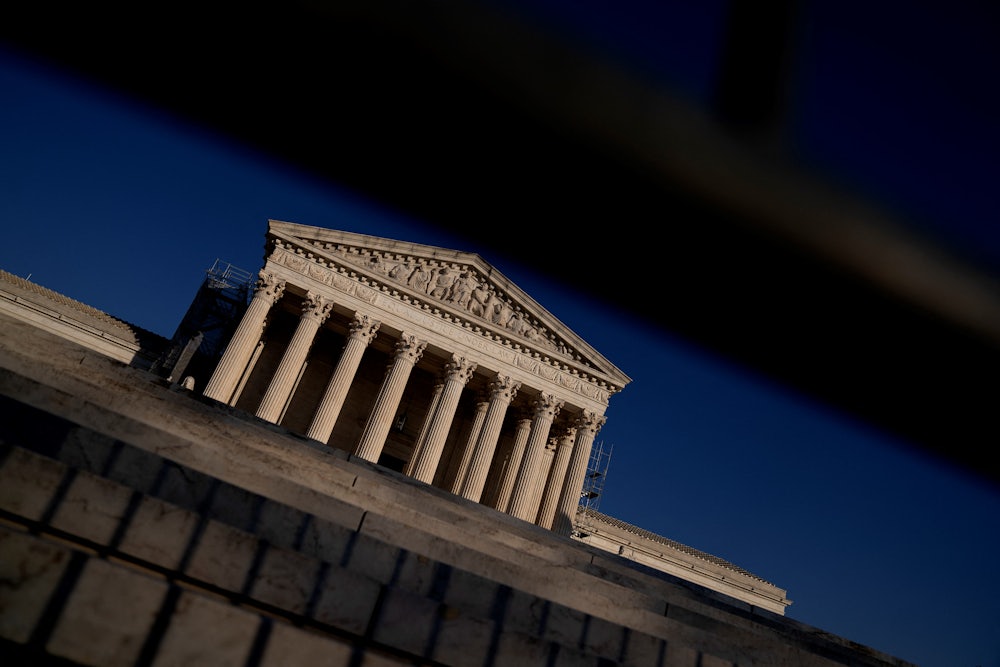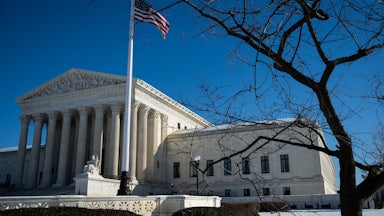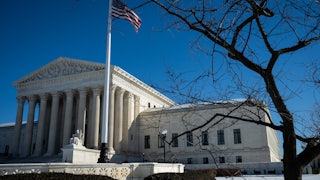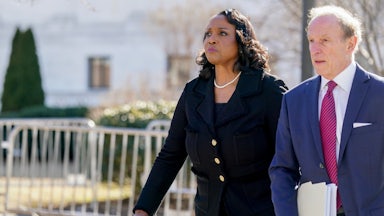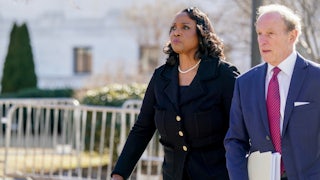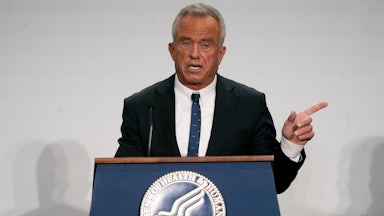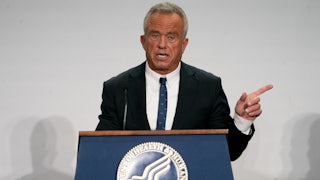The Supreme Court announced this week that it would take up a few major cases. One involved mifepristone, the most commonly used abortion drug in the country, and whether the Food and Drug Administration had improperly approved certain uses of it. Another will address the scope of an obstruction law that formed the basis of many important January 6–related prosecutions.
Also tucked away in Wednesday’s orders was a less prominent case that could nonetheless have important implications for Americans’ confidence in their public officials. In Snyder v. United States, the justices will consider whether the federal government can prosecute public officials for receiving “gratuities”—cash or other gifts without an explicit quid pro quo—from their constituents after performing favorable services for them. In practical terms, the case gives the justices another chance to weaken federal anti-corruption laws even further.
The two sides in the case agree on some basic facts. James Snyder, the defendant, was elected to be the mayor of Portage, Indiana, in 2012. Portage is home to just under 38,000 people. While serving as mayor, he oversaw the bidding process for a contract to purchase new waste-management trucks for the town. Those contracts, which were worth more than $1.1 million, went to a local trucking company. In January 2014, one month after the final round of contracts was signed, the company paid Snyder $13,000 for “insurance and technology consulting.”
Snyder’s lawyers portray his situation in sympathetic terms. They say Snyder “sought to supplement his approximately $62,000 salary as mayor” around the time of the bidding process. “As a father of four and owner of a mortgage company hit by the Great Recession, Mayor Snyder was financially strapped and owed tax penalties to the IRS,” they told the justices in their petition for review. “Consistent with Indiana law, which does not forbid small-town mayors from pursuing other employment, Mayor Snyder began offering consulting services.” The truck company in question simply took advantage of them.
The Justice Department saw things differently. The bidding process, from their description, had “significant irregularities.” It was overseen by one of Snyder’s personal friends who had no prior experience in such matters. The local truck company, Great Lakes Peterbilt, was also in financial trouble and needed the contracts to stay afloat. Bidding requirements were drawn up so that only the company could meet them: Only Peterbilt chassis were allowed, the city’s clerk-treasurer was cut out of the process, and alternative candidates were turned down for equipment demonstrations. Snyder communicated extensively with the Buha brothers, who owned the truck company, but not with any other candidates.
After it concluded, Snyder suddenly received a $13,000 check for consulting fees. “Neither [Snyder] nor the Buhas produced any documentation relating to any consulting agreement or services performed by [Snyder] for GLPB, and Snyder did not include the $13,000 payment on a form to disclose compensation he received from parties doing business with the city,” the government told the justices. “And at the time GLPB’s controller issued the check, Robert Buha told the controller that ‘they were paying [Snyder] for his influence.’”
Federal prosecutors charged Snyder with multiple tax and corruption–related charges. Two of the charges came from a provision in federal anti-corruption law known as Section 666. (The satanic allusion appears to be unintentional.) That provision makes it a crime for state, local, territorial, and tribal leaders to “corruptly” take money “intending to be influenced or rewarded in connection with” government business. A jury found Snyder guilty and sentenced him to almost two years in prison.
Snyder, on appeal, sought to dismiss his conviction by arguing that Section 666 required prosecutors to prove quid pro quo corruption—in other words, that he explicitly took the $13,000 in exchange for official acts. Prosecutors had argued that the statute’s language allowed them to charge Snyder just for accepting the money as a “gratuity” as opposed to a bribe. They noted that Congress had previously amended the statute to add a guilty-mind requirement through the word “corruptly” to avoid including potentially legitimate business and personal transactions.
The Seventh Circuit Court of Appeals sided with the prosecutors, joining the Second, Sixth, Eighth, and Eleventh Circuits in allowing gratuities to be prosecuted under Section 666. Not every federal appeals court that has considered the question agrees, however. The First and Fifth Circuits have instead held that gratuities do not fall under Section 666’s purview, instead reading the term “corruptly” to require some sort of outright quid pro quo. The Supreme Court is most likely to intervene in cases where the lower courts are sharply divided on how to interpret a federal law.
Snyder asked the justices to confirm that the First and Fifth Circuits got it right. “Section 666 criminalizes only quid pro quo bribes—corrupt exchanges like paying a governor to veto a bill, or giving a housing inspector a luxury watch in exchange for a passing grade,” his lawyers told the court in their petition for review. “The statute does not cover gratuities—payments for actions already taken or planned, like donating to the governor’s campaign in approval of the veto or buying the inspector a nice case of wine after her report is submitted.”
The latter examples illustrate the awkwardness of this case from a nonlegal perspective. While there may be a legal or constitutional difference between giving gifts to a government official before or after they do something, most people would probably consider both acts to be basically corrupt. Indeed, the government argued that there is enough circumstantial evidence of some sort of arrangement between Snyder and the trucking company that the jury may well have concluded there was a quid pro quo arrangement between them.
Legally speaking, however, the Supreme Court’s decision to take up the case is anything but surprising. Since Chief Justice John Roberts’s confirmation in 2005, one of the most consistent themes in its jurisprudence is making it easier for people to give money to elected officials. The court has struck down numerous campaign-finance restrictions, most notably in Citizens United v. FEC and McCutcheon v. FEC, by concluding that campaign donations are a protected form of First Amendment political speech and that the government can only restrict it in cases of quid pro quo corruption.
That emphasis was a recurring theme in Snyder’s argument. “Absent a quid pro quo requirement, Section 666’s reach is amorphous, sweeping up wide arrays of First Amendment-protected interactions with government officials,” they argued. “Officials and citizens across the country should not be left guessing when the everyday hustle and bustle of local politics becomes a federal crime.”
Anti-corruption prosecutions have also found themselves facing a hostile Supreme Court in recent years. In 2016, the justices unanimously overturned the federal bribery conviction of former Virginia Governor Bob McDonnell and his wife. The high court concluded that it wasn’t illegal for a businessman to lavish the couple with expensive clothes and Rolex watches in exchange for favorable treatment because none of McDonnell’s assistance amounted to an “official act” under the law. That ruling hampered federal bribery cases against public officials across the country.
Indeed, if there’s one area of the law where the justices appear to be in ideological lockstep, it’s in making it harder for federal prosecutors to bring corruption charges against public officials and their private backers. Just last term, the liberal and conservative justices joined forces to quash two cases in New York that involved novel interpretations of federal bribery laws to tackle more insidious forms of corruption.
To that end, Snyder’s lawyers emphasized similar themes in the court’s previous anti-anti-corruption rulings. “Criminal laws must give ‘fair notice’ to avoid the risk of ‘arbitrary and discriminatory enforcement,’” they told the justices, quoting from the McDonnell ruling. “Yet, as above, the breadth of conduct potentially meeting the government’s definition of a gratuity is sweeping. As this case illustrates, any time a public servant accepts private employment (think: every ex-state legislator turned lobbyist), federal prosecutors might recast those payments as gratuities for actions taken in office.”
The Justice Department, for its part, noted that the federal government has a strong interest in ensuring that state and local officials are properly spending government funds since federal funds form a significant portion of many state and local budgets. It also argued that the facts surrounding Snyder’s case made it a poor option for consideration. At least four of the justices disagreed, however, and now Americans will learn later this term when and how they can reward their elected officials with cash and gifts for doing things they like.
